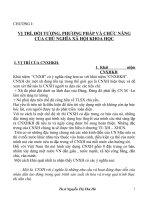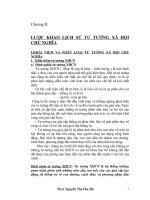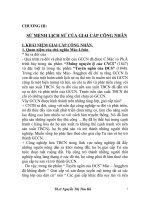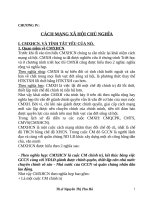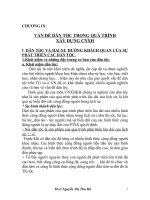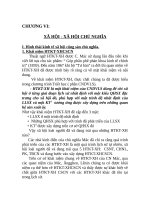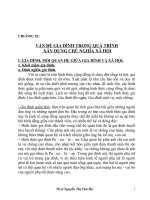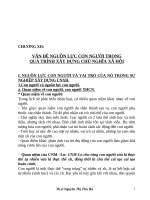On tap 1
Bạn đang xem bản rút gọn của tài liệu. Xem và tải ngay bản đầy đủ của tài liệu tại đây (83.08 KB, 3 trang )
<span class='text_page_counter'>(1)</span><div class='page_container' data-page=1>
<b>PRACTICE 1</b>
<b>Simple Present Tense</b>
<b> Date: June 30th, 2012</b>
<b>I. Make sentences about what you do every day: </b>
1. get up 6. wash the dishes
2. go to work 7. play sports
3. have lunch / breakfast / dinner 8. listen to music
4. come home 9. write letters
5. watch TV 10. go to bed
<b>II. Make negative and question form: </b>
1) We call Alan every day. 2) Emma always dreams in the lessons.
3) They look at their teacher in lesson 4) John comes home from school by bus.
5) I meet my friends every day. 6) He repairs his computer.
7) Walter always says hello to me. 8) The cat always sits under the armchair.
9) You drink too much water. 10) She sometimes forgets the lunchbox.
<b>III. Reading:</b>
Yamada is working for Kawaka Company and his job is to install pipes in
car. He usually gets up at 6.15a.m, and has breakfast with two eggs, vegetable
soup, rice and green tea. Promptly at 6.55 am, he leaves his two-room apartment to
walk to the commuter train station when his children are still sleeping. Every
morning, the train arrives at 7.11a.m and drops him seventeen minutes later at
<i>Hyogo station, a few blocks from work. Yamada hurriedly walks to his factory to</i>
<i>avoid being late.</i>
Like other workers in the factory, Yamada begins his work at 8a.m with a
set of 5-minute exercises. When the noon whistle announces lunch, workers stream
into the lunchrooms. They have lunch with rice, fish, vegetables, and hot tea.
Lunch costs $ 1.50, of which Kamada pays 40 percent. Not much of the noon hour
is spent for eating. At 12.10p.m, workers play games such as table tennis, tennis,
badminton. Yamada sometimes plays badminton or joins a group of workers for
talking. He rarely takes a nap after lunch.
Work resumes at 1p.m, with another set of exercises and Yamada‘s day ends
at 5p.m. Sometimes he has an hour or two of overtime.
For his labour, Yamada earns $780 each month and twice a year he receives
bonuses. He can count on overtime – nearly $ 300 in a typical month – to add to
that. Yamada is not a college graduate so there is no chance of promotion but he
likes his job because the company insures a place for his life. He says:” If you
work hard, it will come back in some way.”
<b>Make questions and answer them: </b>
1. Where / Yamada / work?
2. How / he / go / work?
3. Why / he / hurriedly walk / his factory / after / be / drop / Hyogo station?
4. He / come home / lunch?
</div>
<span class='text_page_counter'>(2)</span><div class='page_container' data-page=2>
<b>IV. Writing: Use the suggestion to write about Bob Wilkins.</b>
Bob Wilkins / work / bank / London/ he / do not live / London. He / live/
Belgium. He / not go to work every day. For two days a week / he / work / home.
He / communicate / the bank / e-mail. Other days / he / travel/ London / train / the
Channel Tunnel. It / cost / a lot / money / he / not want / change it / he / enjoy it.
His wife / from Belgium / she / work / Brussels, so one of them / have / travel /
work. They live / Belgium / they like / lifestyle there.
<b>ANSWER PRACTICE 1</b>
<b>Simple Present Tense</b>
<b> Date: July ..., 2012</b>
<b>I. Make sentences about what you do every day: </b>
6. Every day I get up at ...
7. I go to work at ...
8. I usually have breakfast / lunch / dinner at ...
9. I often come home at ...
10.I always wash the dishes after dinner
11.I usually play sport on Saturday and Sunday
12.I sometimes listen to music at night
13. I usually write letters to my friends on Sunday afternoon
14.I usually watch TV at night
15.I Always go to bed at 11
<b>II. Make negative and question form: </b>
1) We does not call Alan every day. Do you call Alan every day?
2) Emma does not always dreams in the lessons.
Does Emma always dream in the lessons?
3) They do not look at their teacher in lesson.
Do they do not look at their teacher in lesson?
4) John does not come home from school by bus.
Does John come home from school by bus?
5) I do not meet my friends every day. Do you meet your friends every ?
6) He does not repairs his computer. Does he repair his computer?
7) Walter does not always says hello to me.
Does Walter always say hello to you?
8) The cat does not always sits under the armchair.
Does the cat always sit under the armchair?
9) You do not drink much water. Do I drink too much?
10) She does not sometimes forget the lunchbox.
Does she sometimes forget the lunchbox?
<b>III. Reading:</b>
1. Where does Yamada work?
He works for Kawaka Company
2. How does he go to work? He goes to work by train
3. Why does he hurriedly walk to his factory after being dropped at Hyogo
station? So that not to be late / to avoid being late
</div>
<span class='text_page_counter'>(3)</span><div class='page_container' data-page=3>
5. How much does he earn a month? He earns about $780 each month
<b>IV. Writing: Use the suggestion to write about Bob Wilkins.</b>
</div>
<!--links-->
